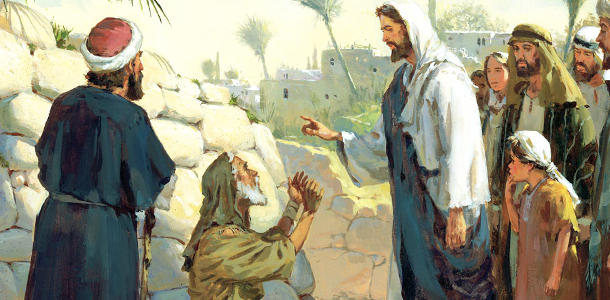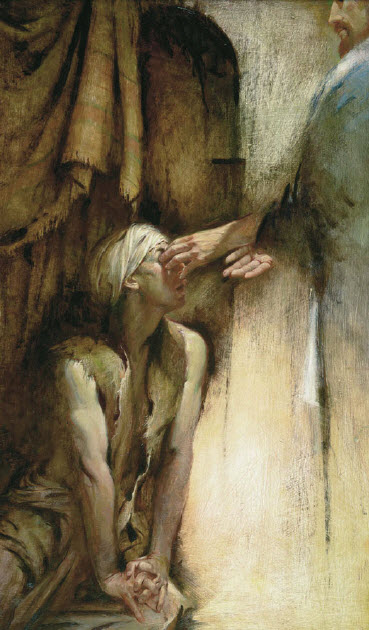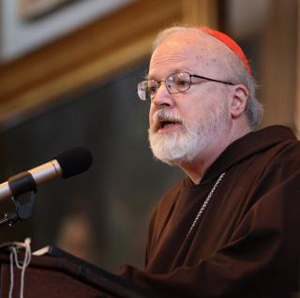Master, I Want to See!
October 23, 2012 By Leave a Comment

Thirtieth Sunday in Ordinary Time – October 28, 2012
The readings for this Sunday are: Jeremiah 31:7-9; Hebrews 5:1-6; Mark 10:46-52
Mark’s healing stories of the blind man of Bethsaida (8:22-26) and the healing of Bartimaeus, the blind man on the road to Jericho (10:46-52) were undoubtedly popular stories in the early Church and they remain very significant stories for the contemporary Church.
These miracles have always fascinated me because I grew up with my father who was an eye doctor. How frequently we spoke about sight impairments, eye diseases, astigmatisms, cataracts and 20/20 vision! My father was also a member of a charitable society that assisted the blind, and I vividly remember volunteering as a child with my father and his doctor colleagues who hosted memorable Christmas parties for blind people.
Road to Jericho
Road to Jericho
Mark tells the story of Jesus’ encounter with Bartimaeus, a blind man and a beggar (10:46-52) in the Gospel for the 30th Sunday in Ordinary Time (Year B). Jesus had made the long, arduous journey down the desert valley from Galilee in the north. He was on his way to Jerusalem, a daunting climb from an oasis on the desert floor to the hills of Judea.
As Jesus passed through Jericho, Bartimaeus heard the din of the crowd and knew that the chance of a lifetime was within his grasp. Bartimaeus was not about to miss this opportunity! From the roadside, he began to cry out, “Jesus, Son of David, have mercy on me!” Some people in Jesus’ entourage were embarrassed to have this dirty, rude beggar bother the master and they attempted to silence him.
What were they embarrassed about? Bartimaeus was simply trying to engage the culture around him and let the people know that he, too, had a right to see Jesus. If individuals in the crowd had heard the rumours about Jesus’ healing powers, wouldn’t they be kind to this poor beggar and bring him to Jesus for healing?
 Bartimaeus would not be denied – and neither would Jesus. As the shouts of the beggar reached his ears, Jesus brushed aside the restraints of his disciples and called to the blind man. Bartimaeus threw off his cloak and drew near to that welcoming voice, which responded to his pleas, “What do you want me to do for you?”
Bartimaeus would not be denied – and neither would Jesus. As the shouts of the beggar reached his ears, Jesus brushed aside the restraints of his disciples and called to the blind man. Bartimaeus threw off his cloak and drew near to that welcoming voice, which responded to his pleas, “What do you want me to do for you?”
“My teacher, let me see again.” And Bartimaeus did see, not just with his eyes but more importantly, with his heart. Though Bartimaeus was blind to many things, he clearly saw who Jesus is. Seeing “who Jesus is” is the goal of faith, and it leads to discipleship. At the end of the story, Bartimaeus regained his sight and followed Jesus on the way. Given that the very next verse in Mark narrates the entry into Jerusalem, we can be certain that Bartimaeus followed Jesus on the way to the cross.
Blindness metaphor
Compassion for the outcast was a hallmark of Jesus’ ministry and healing stories in the Gospels never seem to be simply a reversal of physical misfortune. In the stories of those who “once were blind, but now they see,” the connections between seeing and believing are so strong that these miracles worked by Jesus are more about growing in faith than letting the scales of blindness fall away.
Disciples of Jesus have vision problems. How often do we use the metaphor of blindness to describe our inability to grasp the meaning of the suffering we endure? We sometimes describe our blindness as an inability to see the forest for the trees, but that is a rather simplistic analysis. More worrisome is the inherited blindness which so often assumes that there are no lessons left to learn. Arrogance is very often the root of our blindness. We need the miracle of restored sight each day.
What corners of the Church, of society and of our culture need serious healing, restoration and reformation in our time? Where are our blind spots? Where are the big problems with near-sightedness and far-sightedness? How often do we prefer monologue to dialogue, refusing to believe that we might learn from those who oppose us and disagree with us; refusing to engage the culture around us and preferring a narrow, obstinate and angry way of existing? How often do we say that there are no other ways to look at an issue than our way … or the highway!
How often do we behave like those who tried to prevent Bartimaeus from seeing and meeting the Lord? Against the cries of the scoffers and cynics in our midst, do we dare to bring our friends, colleagues and loved ones into the very presence of the Lord? How can we not, when we know the result of a lifetime without Christ?
Healing, restoration and sight
Abortion is the most serious wound inflicted not only on individuals and their families who should provide the sanctuary for life, but inflicted as well on society and its culture, by the very people who ought to be society’s promoters and defenders. It is important to recall Benedict XVI’s words and pro-life vision at theWelcoming Celebration by the Young People of World Youth Day 2008 in Sydney, on July 17, 2008:
And so we are led to reflect on what place the poor and the elderly, immigrants and the voiceless, have in our societies. How can it be that domestic violence torments so many mothers and children? How can it be that the most wondrous and sacred human space – the womb – has become a place of unutterable violence?
The Roman Catholic Church offers a teaching on the inviolability, the sacredness and the dignity of the human person: a 20/20 vision for which we must strive each day if we claim to be pro-life.
Opposition to abortion and euthanasia does not excuse indifference to those who suffer from poverty, violence and injustice. We must strive to see the whole picture, not with tunnel vision.
To say that we are pro-life means that we are against whatever is opposed to life itself, such as any type of murder, genocide, abortion, euthanasia or wilful self-destruction.
We stand firmly against whatever violates the dignity of the human person such as mutilation, torments inflicted on body or mind, attempts to coerce the will itself, whatever insults human dignity such as subhuman living conditions, arbitrary imprisonment, deportation, slavery, prostitution, the selling of women and children, and disgraceful working conditions where people are treated as instruments of gain rather than as free and responsible persons. All of these things and more destroy human life and poison human society.
 Capuchin Cardinal Sean O’Malley, archbishop of Boston, recently wrote:
Capuchin Cardinal Sean O’Malley, archbishop of Boston, recently wrote:Our ability to change people’s hearts and help them to grasp the dignity of each and every life, from the first moment of conception to the last moment of natural death, is directly related to our ability to increase love and unity in the Church, for our proclamation of the Truth is hindered when we are divided and fighting with each other.
Being pro-life is one of the deepest expressions of our baptism: We stand up as sons and daughters of the light, clothed in humility and charity, filled with conviction, speaking the truth to power with firmness, conviction and determination, and never losing joy and hope.
Being pro-life is not an activity for a political party or a particular side of the spectrum. It is an obligation for everyone: left, right and centre! If we are pro-life, we must engage the culture around us, and not curse it. We must see others as Jesus does, and we must love them to life, even those who are opposed to us.
As we recognize the things that blind us from the Lord and paralyze us from effective action, let us never cease begging the Lord to heal us! “Lord, that I may see!” And when our vision is restored, let us get up to follow him joyfully along the way to the Kingdom.
A Prayer for Sight
Origen (185-253)
Origen (185-253)
May the Lord Jesus touch our eyes,
As he did those of the blind.
Then we shall begin to see in visible things
Those which are invisible.
May he open our eyes to gaze not on present realities, But on the blessings to come.
May he open the eyes of our heart
to contemplate God in Spirit, Through Jesus Christ the Lord,
To whom belong power and glory
through all eternity. Amen.
Fr. Thomas Rosica, CSB
CEO, Salt and Light Catholic Media Foundation
CEO, Salt and Light Catholic Media Foundation
